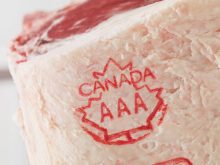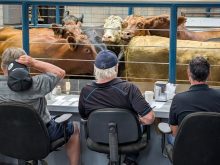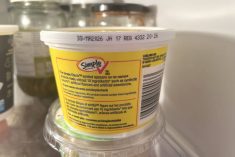The world’s farmers are poised for a year of plenty in 2012 after last year’s weather-related disasters, and prospects of lower grain prices from bumper harvests could offer relief to the battered bottom lines of grain and food companies.
Food and beverage companies like Sara Lee, PepsiCo and General Mills have struggled to absorb high costs of meat and grains in the past year, while economic uncertainty has hammered agribusiness giants.
While weather worries persist in some areas — notably droughts affecting crops in South America and the southern U.S. Plains — expanded global farm production looks to take the sting out of farm prices for food makers by late 2012.
Read Also

Trade uncertainty, tariffs weigh on Canadian beef sector as market access shifts
Manitoba’s beef cattle producers heard more about the growing uncertainty they face as U.S. tariffs, and shifting trade opportunities, reshape their market.
“Let’s make the assumption (prices) stay down year over year; that would be a pretty welcome event,” said Matt Arnold, a consumer analyst at Edward Jones in St. Louis.
Commodity pricing will be one of the themes when top executives from food, drink and agriculture companies, including Nestle, General Mills, Beam Inc. and Cargill gathered at the Reuters Food and Agriculture Summit in Chicago March 12-15.
Makers of breakfast cereal and other packaged foods, such as Kellogg and Kraft Foods Inc., absorbed some of the recent spike in grain prices and are unlikely to pass along all of their expected cost savings to consumers, Arnold said.
Instead, food makers will probably offer shoppers short-term relief through promotions and coupons, while pocketing some savings to offset the hit they shouldered when grain prices ran up, he said.
The implications of lower grain prices are more of a mixed blessing for meat processors, Arnold said.
Hormel Foods, seller of SPAM and Jennie-O turkeys, would save on feed costs for its turkey-raising operation, but farmers might use those savings to expand their flocks over time, pressuring overall turkey prices.
U.S. beef packers have posted big losses since late last year as the prices they paid for cattle outstripped what they earned on beef, according to private data.
The high cost of cattle has pinched JBS, the world’s largest beef processor as well as owner of the largest U.S. cattle-feeding operation.
On the restaurant side, regional, semi-national chains such as Sonic Corp. and Jack in the Box might have the most to gain from food cost relief, since they are not protected by the greater bargaining power enjoyed by names like McDonald’s and KFC parent YUM Brands, said RJ Hottovy, an analyst at Morningstar.
“Corn costs, which play a big part in (influencing) just about all the commodities out there, especially for restaurants, have certainly been a headwind for the past two years,” he said. “I think restaurants are looking for any kind of relief as soon as they can.”














